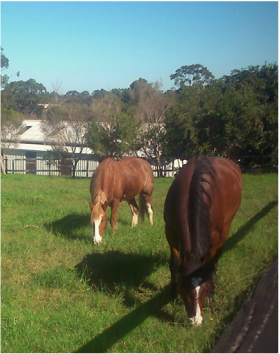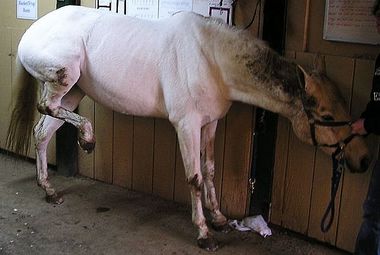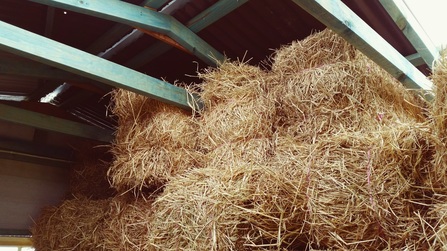Why does your horse need to eat ALL the time?
|
The horse evolved to be a grazing animal, “trickle” feeding on grasses for most of the day while on the move. These grasses were not very nutritious – low in easily digestible sugars and starches, and higher in structural carbohydrates (these form the plant’s cell walls – also referred to as fibre – mammals are not able to digest this). Horses have therefore adapted a few clever traits to survive:
|
Unfortunately, modern life does not always allow for the horse’s natural ways. We have tended to confine our horses, and feed them large, energy rich, low fibre meals a couple of times a day – out of convenience, necessity or misplaced good intentions. And even where horses have more opportunity to forage, pasture and hays have been bred for the livestock industry, resulting in increased energy and protein levels, which the horse never evolved to eat.
This clash between the basic biology of the horse, and its modern lifestyle has caused a number of problems:
This clash between the basic biology of the horse, and its modern lifestyle has caused a number of problems:
|
- Colic – although this has a number of causes, the risk of colic is lower when horses have access to high levels of forage, and increases with higher levels of concentrates or grain. Again, this is probably due to the disruption of the good bacteria in the gut, setting of a cycle of events that lead to poor gut function and potential colic.
- Behavioural problems – feeding meals rather than allowing a steady stream of intake is associated with excitable behaviour and stereotypic behaviours. These behaviours may be caused by the pain or discomfort of digestive upset, or could be caused by the sudden peak of glucose in the blood following a sugary or starchy meal – just like kids on a sugar high! A third reason is that a horse not provided with sufficient forage is not able to express its highly motivated natural behaviours – this can cause frustration and stress.
- Insulin resistance – whilst insulin resistance has a genetic component, and is also related to the consumption of too much sugary or starchy feed (including some forages), not allowing the horse to forage naturally may also contribute to this increasingly common problem. Restricting grazing or feed can lead to metabolic imbalance – either through fluctuating glucose levels which place pressure on the insulin system, or by causing low-grade, chronic stress simply due to the horse being in the unnatural position of not being able to find anything to eat. Cortisol and other stress hormones can further imbalance energy metabolism and insulin sensitivity.
|
The challenge we face to keep our horses in optimum health and well being and avoid these problems is to keep our horses eating… all the time… without consuming too much energy (kilojoules/calories), especially if they are not exercising or are good-doers. Low sugar/starch hays, slow feeders and pasture/grazing management are all part of the solution.
Find more articles here, and check out the Facebook page for more interesting, informative links and articles from Integral Equine Nutrition. |



